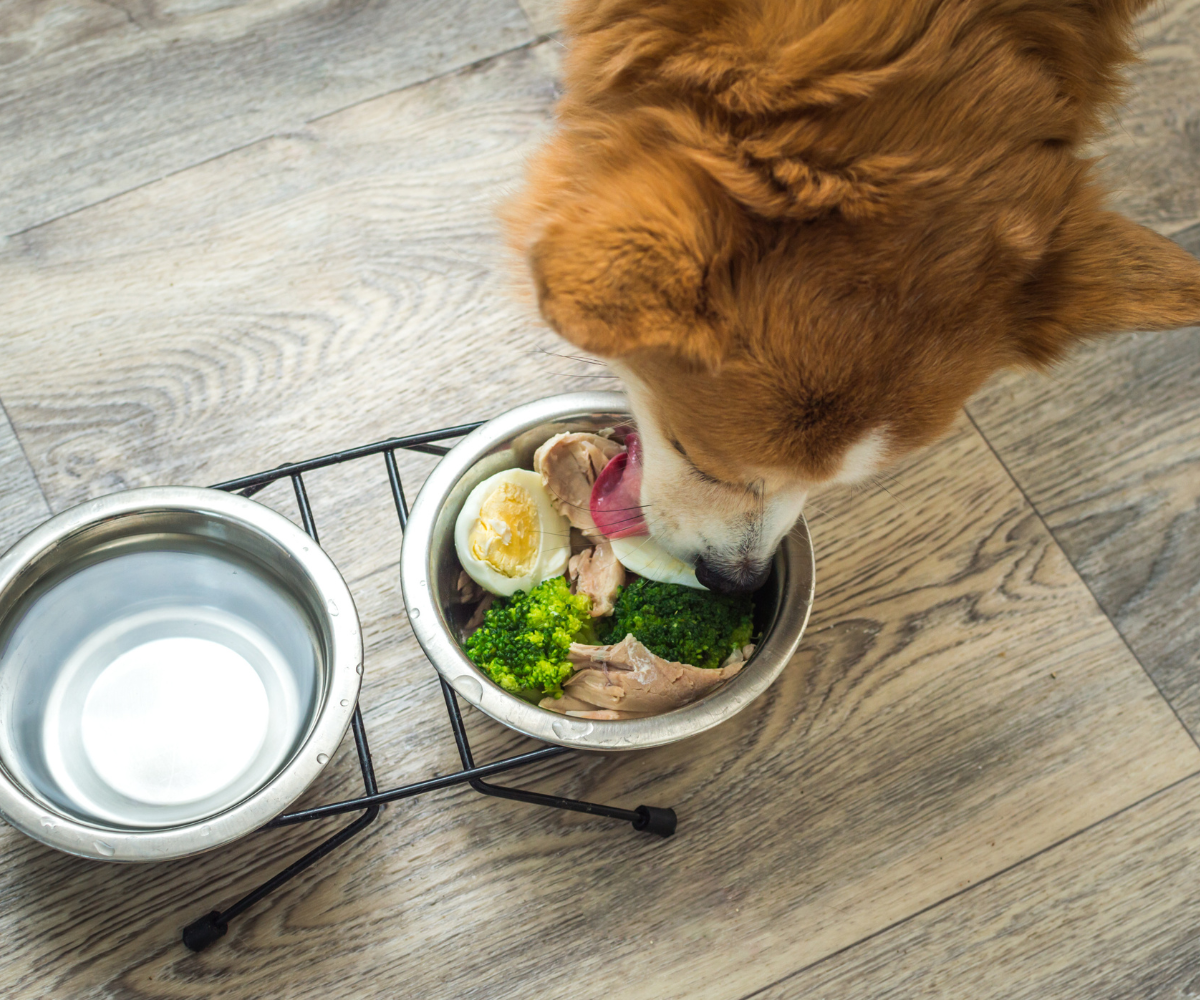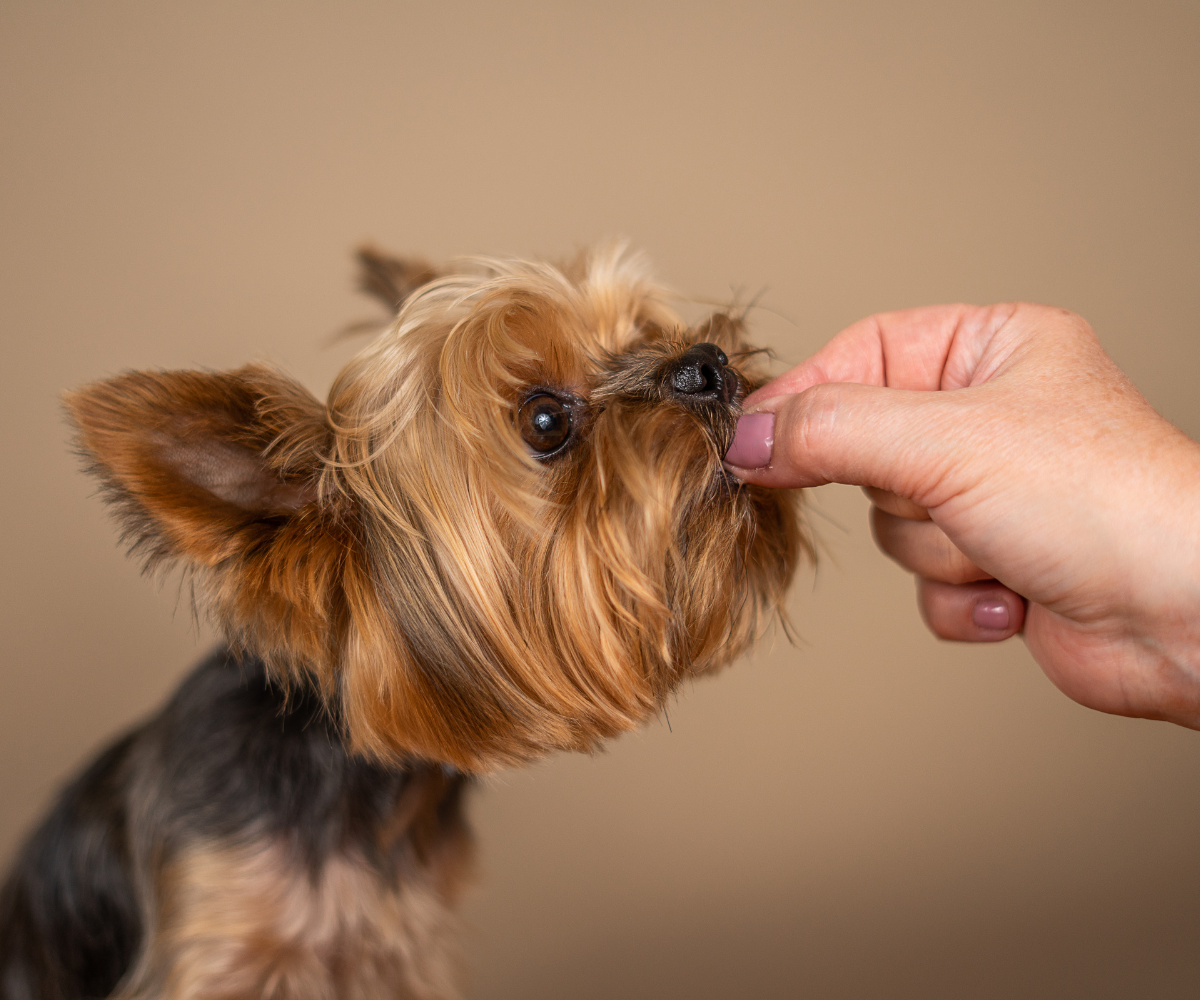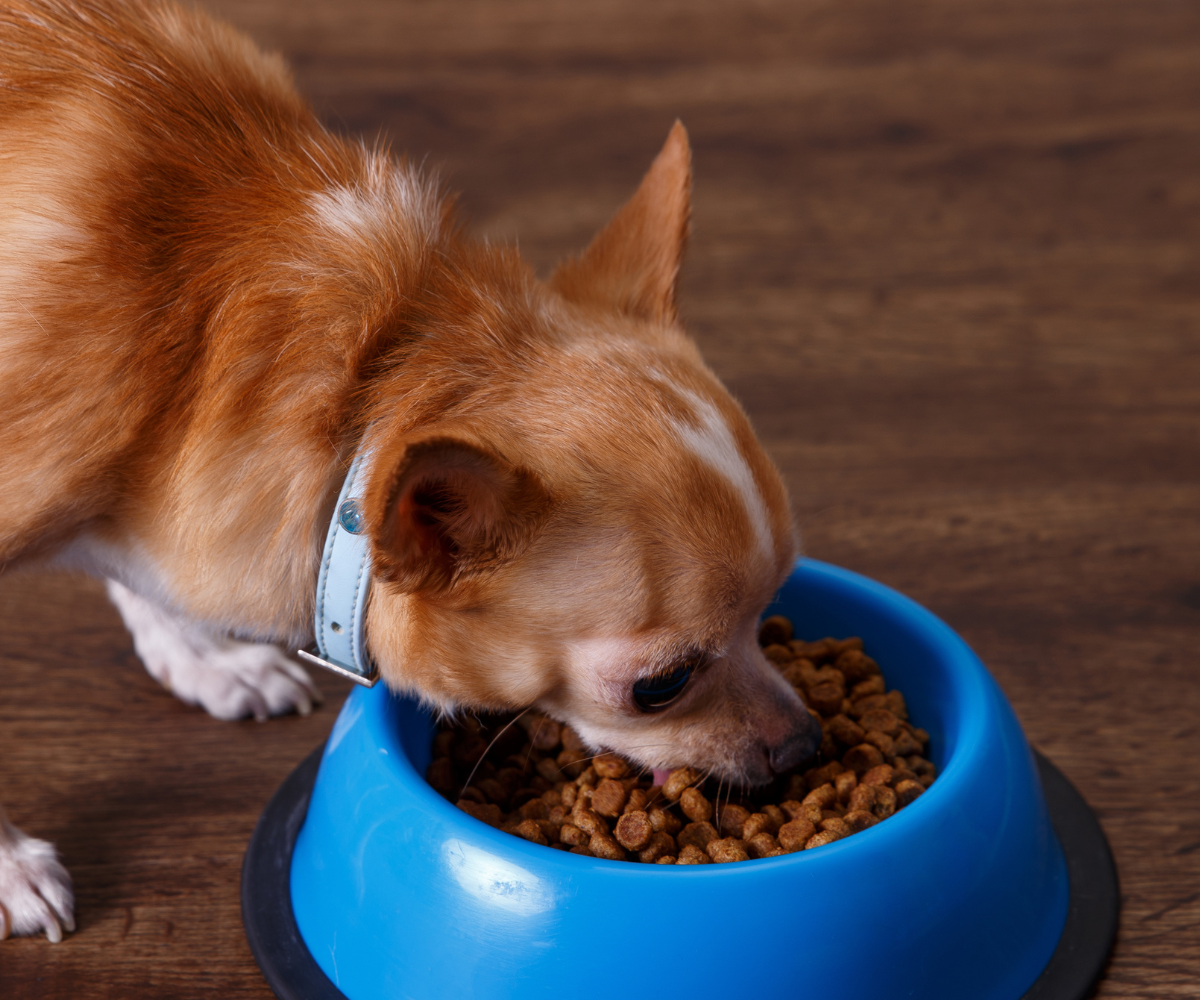13 Ways to Improve Your Dog's Digestion - Full Guide
13 Ways to Improve Your Dog's Digestion - Full Guide

Vet Reviewed

By: Sarah Hodgson
March 11, 2024
Table of Contents
Improving your dog's digestion is essential for their overall health and well-being. A healthy digestive system ensures that your dog is absorbing all the necessary nutrients from their food, which helps them maintain a healthy weight, a shiny coat, and strong muscles.
In this article, we will explore 14 ways to improve your dog's digestion, providing you with a full guide to help you keep your dog healthy and happy.
Let's dive in!
Understanding Dog Digestion
Before we jump into the article it's essential to understand how your dog's digestive system works.
The digestive system of dogs is complex and comprises the mouth, esophagus, stomach, small and large intestines, and colon. The system works to break down food, extracting essential nutrients that your dog needs to stay healthy.
The small intestine plays a crucial role in nutrient absorption, supported by diverse cell types and enzymes. The large intestine absorbs water and electrolytes to form solid feces, which are then eliminated through the rectum.
Here are some key points to keep in mind when it comes to understanding your dog's digestion:
- Dogs have a shorter digestive tract than humans, which means that food passes through their system more quickly.
- Dogs have a higher stomach acidity level than humans, which helps them digest food more efficiently.
- Dogs are carnivores and have evolved to digest meat-based diets. However, they can also digest plant-based foods.
Why Is Improving Your Dog's Digestion Important
One of the most important aspects of your dog's health is their digestion. A healthy digestive system ensures that your dog is able to absorb the necessary nutrients from their food, which in turn, keeps them healthy and energetic.
There are many reasons why improving your dog's digestion is important. Here are a few key reasons:
- Better Nutrient Absorption: A healthy digestive system ensures that your dog is able to absorb the necessary nutrients from their food. This is important because without proper nutrient absorption, your dog may suffer from malnutrition, which can lead to a variety of health problems.
- Improved Energy Levels: When your dog's digestive system is working properly, they will have more energy. This is because their body is able to efficiently convert the nutrients from their food into energy that they can use throughout the day.
- Reduced Risk of Digestive Issues: Dogs that have poor digestion are more likely to suffer from digestive issues such as diarrhea, constipation, and vomiting. By improving your dog's digestion, you can reduce their risk of these issues and keep them feeling their best.
- Better Overall Health: A healthy digestive system is a key component of your dog's overall health. By improving their digestion, you can help keep them healthy and happy for years to come.
Improving your dog's digestion may seem like a difficult task, but there are many simple things that you can do to make a big difference. In the next section, we will explore some of the best ways to improve your dog's digestion.

14 Ways To Improve Dog Digestion
1. Raw Food
One of the best ways to improve your dog's digestion is by feeding them a raw food diet. Raw food is a natural and biologically appropriate feeding approach that can improve digestion and support optimal canine digestive health. By providing a diet rich in natural enzymes, probiotics, balanced fiber, and easily digestible nutrients, raw feeding promotes healthy gut function, reduces allergens and inflammation, and strengthens the immune system.
Raw food is a nutrient-rich diet that can help regulate bowel movements and create a happy dog. However, you need to be very careful if you choose to provide raw food to your dog. It's essential to ensure that the food is fresh, high-quality, and safe to consume. You should also consult with your veterinarian before starting a raw food diet, especially if your dog has underlying health issues that may affect their digestion.
Feeding your dog raw food can be an excellent way to improve their digestion, but it's not suitable for every dog.
2. Avoid human food

Feeding your dog human food can be tempting, but it can also lead to digestive problems. Human food is often high in fat, sugar, and salt, which can be harmful to your dog's health. In addition, some human foods can be toxic to dogs, such as chocolate, grapes, and onions.
To avoid digestive problems, it's best to stick to a balanced diet of high-quality dog food. If you want to give your dog a treat, choose a healthy option such as a piece of carrot or apple.
It's important to note that some human foods can be beneficial to dogs when given in moderation. For example, cooked chicken or turkey can be a good source of protein, and plain yogurt can help promote healthy gut bacteria. However, it's best to consult with your veterinarian before adding any human food to your dog's diet.
3. Pay attention to ingredients
The ingredients in your dog's food can have a big impact on their digestion. Here are some things to keep in mind when selecting dog food:
Look for high-quality protein sources
Protein is essential for your dog's health, but not all protein sources are created equal. Look for high-quality protein sources, such as chicken, fish, and lamb. These protein sources are easily digestible and provide your dog with the amino acids they need to maintain muscle mass and support their immune system.
Avoid fillers and artificial additives
Fillers, such as corn and wheat, can be difficult for your dog to digest and provide little nutritional value. Artificial additives, such as preservatives and food dyes, can also be hard on your dog's digestive system. Look for dog food that is free from these ingredients.
Consider fiber content
Fiber is important for your dog's digestion, but too much or too little can cause problems. Look for dog food that contains a moderate amount of fiber, around 3-5%. This will help regulate your dog's bowel movements and promote healthy digestion.
Read the label
It's important to read the label on your dog's food to understand what you're feeding them. Look for ingredients that you recognize and can pronounce. If you're unsure about an ingredient, do some research to make sure it's safe for your dog to consume.
By paying attention to the ingredients in your dog's food, you can help improve their digestion and overall health.
4. Exercise
Regular exercise is essential for maintaining your dog's overall health, including their digestive system. Exercise helps to stimulate the digestive tract, which can help to prevent constipation and other digestive issues. It also helps to increase blood flow, which can improve the absorption of nutrients.
There are many different types of exercise that you can do with your dog, such as walking, running, swimming, and playing fetch. The type and amount of exercise your dog needs will depend on their age, breed, and overall health. It's always a good idea to consult with your veterinarian to determine the appropriate exercise routine for your dog.
In addition to regular exercise, you can also incorporate activities that specifically target your dog's digestive system. For example, you can try giving your dog interactive toys that require them to work for their food, such as puzzle feeders or treat-dispensing toys. These toys can help to stimulate your dog's digestive system and keep them mentally engaged.
Note
It's important to note that while exercise can be beneficial for your dog's digestive system, too much exercise can actually have the opposite effect.
5. Slow Feeding
Slow feeding is an effective way to improve your dog's digestion and prevent them from eating too quickly. Eating too quickly can cause your dog to swallow air, leading to bloating, vomiting, and other digestive issues. Here are some ways to slow down your dog's eating:
- Use a Slow Feeder Bowl: Slow feeder bowls are designed to make it more difficult for your dog to eat their food quickly. These bowls have ridges, bumps, and other obstacles that force your dog to eat slower. You can find slow feeder bowls at most pet stores or online.
- Create Obstacles: You can create obstacles in your dog's bowl to slow down their eating. Place a few large rocks or a tennis ball in their bowl to make it more difficult for them to eat quickly.
- Feed Smaller Meals: Feeding your dog smaller meals throughout the day can help prevent them from eating too quickly. Instead of feeding your dog one large meal, divide their food into two or three smaller meals.
- Use Treat Dispensing Toys: Treat dispensing toys are a great way to slow down your dog's eating. These toys have small holes that dispense treats as your dog plays with them. This encourages your dog to eat slower and provides mental stimulation.
- Hand Feed: Hand feeding your dog can also help slow down their eating. This allows you to control the pace of their eating and prevent them from eating too quickly.

6. Probiotics
Probiotics are live bacteria and yeasts that are good for your dog's digestive system. They are often referred to as "good" or "friendly" bacteria because they help keep your dog's gut healthy. Probiotics are naturally found in your dog's body, but they can also be found in certain foods and supplements.
Probiotics can help improve your dog's digestion in several ways. They can aid in the breakdown and absorption of food, which can help prevent digestive problems such as bloating, constipation, and diarrhea. They can also help boost your dog's immune system by fighting off harmful bacteria and viruses.
Some good sources of probiotics for dogs include:
- Yogurt: Yogurt contains live cultures of beneficial bacteria, but make sure to choose a plain, unsweetened variety.
- Kefir: Kefir is a fermented milk drink that contains a variety of beneficial bacteria and yeasts.
- Probiotic supplements: There are many different probiotic supplements available for dogs, so be sure to choose one that is high-quality and specifically formulated for dogs.
7. Hydration
Proper hydration is as important for dogs as it is for us humans. Water is the most important nutrient for your dog, and it is essential to make sure your dog drinks enough water throughout the day. Dehydration can cause constipation, which can lead to other digestive issues such as bloating and discomfort.
To ensure your dog stays hydrated, follow these tips:
- Provide fresh, clean water at all times. Refill your dog's water bowl with fresh water throughout the day. Consider using a stainless steel or ceramic bowl, as they are easier to clean and less likely to harbor bacteria.
- Encourage your dog to drink water. Some dogs may not drink enough water on their own, so it's important to encourage them to drink. You can do this by adding a splash of low-sodium chicken or beef broth to their water bowl, or by offering them ice cubes to chew on.
- Consider wet food. Wet food has a higher water content than dry food, which can help keep your dog hydrated. If your dog is not a fan of wet food, you can add a little bit of water to their dry food to make it more appealing.
- Avoid giving your dog too many treats. Treats can be high in calories and low in water content, which can lead to dehydration. Make sure to limit the number of treats you give your dog and choose treats that are low in calories and high in water content, such as watermelon or cucumber.
- Monitor your dog's water intake. Keep an eye on how much water your dog is drinking throughout the day. If you notice that your dog is not drinking enough water or is drinking too much water, it may be a sign of an underlying health issue.
- Provide water during exercise. If you take your dog for a walk or run, make sure to bring water with you and offer it to your dog throughout the exercise.
- Consider a water fountain. Some dogs prefer to drink running water, and a water fountain can encourage them to drink more water. Plus, it can help keep the water fresh and clean.
8. Avoid Overfeeding
Overfeeding your dog can lead to various health problems such as obesity, digestive issues, and even heart disease. Therefore, it is important to keep track of your dog's food intake and avoid overfeeding them. Here are some tips to help you avoid overfeeding your dog:
- Measure your dog's food: Use a measuring cup to ensure you are giving your dog the right amount of food. Follow the feeding instructions on the dog food packaging or consult with your veterinarian to determine the appropriate amount of food for your dog's breed, age, and weight.
- Stick to a feeding schedule: Feeding your dog on a schedule will help them maintain a healthy weight and avoid overeating. Divide your dog's daily food intake into two or three meals and feed them at the same time every day.
- Avoid table scraps: Feeding your dog table scraps can lead to overfeeding and digestive issues. Instead, give your dog healthy treats such as carrots, apples, or small pieces of cooked meat.
- Monitor your dog's weight: Regularly monitor your dog's weight and body condition to ensure they are not becoming overweight. If you notice your dog is gaining weight, reduce their food intake and increase their exercise.
- Avoid free-feeding: Leaving food out for your dog to eat at their leisure can lead to overeating and weight gain. Instead, measure out your dog's food and feed them at scheduled times.
9. Frequent Meals
One of the most important things you can do to improve your dog's digestion is to feed them regular meals. Dogs thrive on routine, and feeding them at the same time every day can help regulate their digestive system.
When you feed your dog regularly, you help keep their metabolism on track. This means that their body will be better able to digest and process their food, which can help prevent digestive issues like constipation, diarrhea, and vomiting.
10. Avoid Sudden Diet Changes
Sudden diet changes can cause digestive upset in dogs. If you need to change your dog's diet, it's important to do so gradually over a period of several days or weeks. This will give your dog's digestive system time to adjust to the new food.
Here are some tips for transitioning your dog to a new diet:
- Start by mixing a small amount of the new food with your dog's current food. Gradually increase the amount of new food and decrease the amount of old food over a period of several days.
- Monitor your dog's stool during the transition period. If your dog experiences diarrhea or other digestive upset, slow down the transition process or consult with your veterinarian.
- Consider using a probiotic supplement to support your dog's digestive health during the transition period.
11. Stress Management
Stress can have a significant impact on your dog's digestive health. Just like humans, dogs can experience stress from a variety of sources, including changes in routine, loud noises, and separation anxiety. When your dog is stressed, their body releases hormones that can disrupt digestion and cause gastrointestinal discomfort.
To help manage your dog's stress levels, consider the following:
- Routine: Establish a consistent routine for your dog, including regular feeding times, exercise, and playtime. Dogs thrive on routine and predictability, and having a consistent schedule can help reduce stress.
- Exercise: Regular exercise is not only good for your dog's physical health but can also help reduce stress and anxiety. Make sure your dog gets plenty of exercise each day, whether it's a walk around the block or a game of fetch in the backyard.
- Mental stimulation: Providing your dog with mental stimulation can help reduce stress and boredom. Consider using puzzle toys, interactive games, or training sessions to keep your dog's mind engaged.
- Calming supplements: Certain supplements, such as chamomile and valerian root, can help promote relaxation and reduce stress in dogs. Talk to your veterinarian about whether these supplements may be appropriate for your dog.
- Behavioral training: If your dog experiences separation anxiety or other behavioral issues that contribute to stress, consider working with a professional dog trainer or behaviorist to address these issues.
12. Gut Health Supplements
In addition to a healthy diet, gut health supplements can be a great way to improve your dog's digestion. Here are some popular supplements that you may want to consider:
Probiotics
Probiotics are live bacteria and yeasts that are good for your dog's digestive system. They help to balance the good and bad bacteria in the gut, which can improve digestion and overall health. Some popular probiotic supplements for dogs include:
- Four Leaf Rover Gut Guard
- PetLab Co. Probiotic Chews
- Purina Pro Plan Veterinary Diets FortiFlora Probiotic Supplement
Prebiotics
Prebiotics are non-digestible fibers that feed the good bacteria in your dog's gut. They can help to improve the balance of bacteria and promote healthy digestion. Some popular prebiotic supplements for dogs include:
- InClover Optagest Prebiotic Supplement
- Zesty Paws Probiotic Bites with Natural Digestive Enzymes
- NaturVet Digestive Enzymes Plus Probiotic Soft Chews
Digestive Enzymes
Digestive enzymes help to break down food and improve nutrient absorption. They can be especially helpful for dogs with digestive issues or those who are on a raw food diet. Some popular digestive enzyme supplements for dogs include:
- NaturVet Digestive Enzymes Powder
- Zesty Paws Digestive Enzymes with Probiotics & Prebiotics
- PetHonesty 10-for-1 Multivitamin with Glucosamine & Digestive Enzymes
Note
It's important to note that not all supplements are created equal, and some may not be suitable for all dogs. Always consult with your veterinarian before starting your dog on any new supplements, and follow the recommended dosages carefully.

13. Regular Veterinary Check-Ups
Keeping up with regular veterinary check-ups is crucial to maintaining your dog's overall health and well-being, including their digestion. Your veterinarian can monitor your dog's digestive health, identify any potential issues, and provide treatment before they become serious problems.
During your dog's check-up, your veterinarian may perform a physical examination, take blood and stool samples, and recommend dietary changes or supplements to improve your dog's digestion. They may also recommend regular dental cleanings to prevent dental disease, which can lead to digestive issues.
The Bottom Line
So there you have it. Improving your dog's digestion is important for their overall health and well-being. By following the tips provided in this guide, you can help your dog maintain a healthy digestive system.
Here are some key takeaways to keep in mind:
- Feed your dog a high-quality, balanced diet that is appropriate for their age, breed, and activity level.
- Avoid feeding your dog table scraps, as they can be high in fat and difficult to digest.
- Provide your dog with plenty of fresh water throughout the day to help keep them hydrated.
- Give your dog plenty of opportunities to exercise, as this can help improve their digestion.
- Consider adding probiotics or digestive enzymes to your dog's diet to help improve their digestion.
- Talk to your veterinarian if you have concerns about your dog's digestive health.
Remember, every dog is different, and what works for one may not work for another. Be patient and persistent, and don't hesitate to seek professional advice if you need it. With the right care and attention, you can help your dog maintain a healthy digestive system for years to come.
Frequently Asked Questions
What natural remedies can aid in a dog's digestion?
There are several natural remedies that can help improve your dog's digestion. These include adding probiotics and digestive enzymes to their diet, feeding them a balanced and nutrient-rich diet, and providing them with plenty of fresh water. Additionally, some herbs like ginger, peppermint, and chamomile can be beneficial for dogs with digestive issues.
Which foods are beneficial for a dog's digestive health?
Foods that are rich in fiber, such as sweet potatoes, pumpkin, and green beans, can help improve your dog's digestive health. Additionally, lean proteins like chicken and fish can be easier for dogs to digest than red meats. It's important to avoid feeding your dog foods that are high in fat or sugar, as these can cause digestive upset.
What are the common signs of digestive issues in dogs?
Common signs of digestive issues in dogs include vomiting, diarrhea, constipation, loss of appetite, and lethargy. If your dog is experiencing any of these symptoms, it's important to take them to the vet for a checkup.
Are there any side effects of dog digestion medicines to be aware of?
Like all medications, dog digestion medicines can have side effects. Some common side effects include nausea, vomiting, and diarrhea. It's important to follow your vet's instructions carefully when giving your dog any medication.

Subscribe to Petfluence!
Get updates on the latest posts and more from Petfluence straight to your inbox.